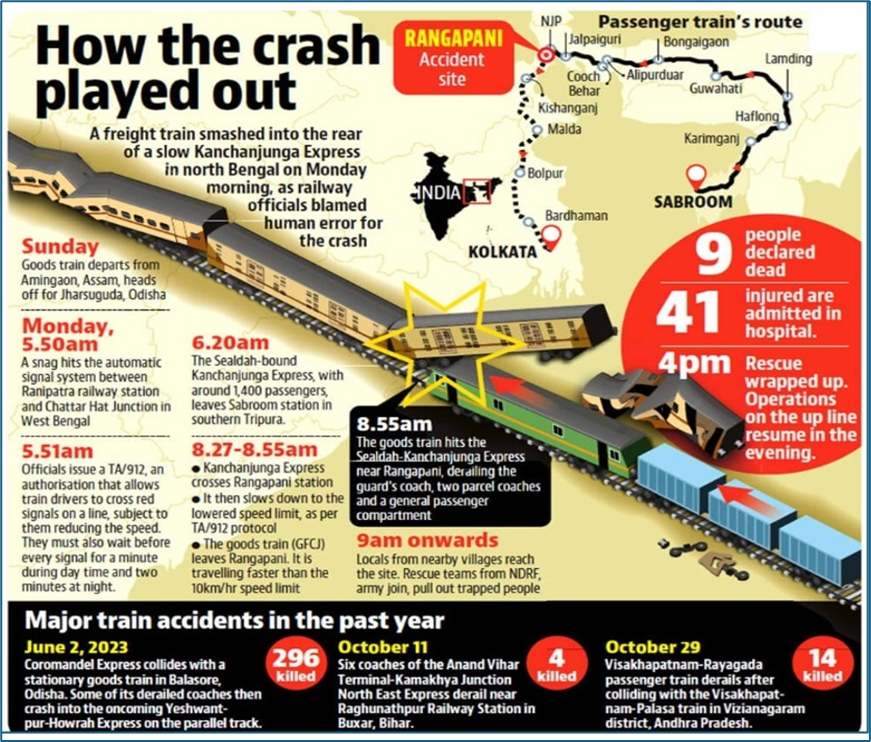Why in news?
The Commissioner of Railway Safety (CRS) attributed the Kanchanjunga Express-goods train collision in West Bengal, in June 2024, to "lapses at multiple levels," including those by station staff and officials at divisional and zonal railway levels.
Labeling it an "accident-in-waiting," the CRS noted the failure to manage train operations during automatic signal failures as a key factor that led to the incident.
To prevent similar accidents, the CRS recommended the urgent implementation of the KAVACH automatic train-protection system.
What’s in today’s article?
- Commissioner of Railway Safety (CRS)
- Kanchanjunga express accident
- Key Highlights of the Report
- Ministry of Railways’ Response and Actions
Commissioner of Railway Safety (CRS)
- About
- CRS is a statutory body. It is headed by the Chief Commissioner of Railway Safety.
- It deals with matters related to safety of rail travel and operations, as laid down in the Railways Act, 1989.
- Investigating serious train accidents is one of the key responsibilities of the CRS.
- The commission also makes recommendations to the government.
- Headquarters: Lucknow, Uttar Pradesh.
- Nodal Ministry
- CRS does not report to the Ministry of Railways of the Railway Board.
- It is, in fact, under the administrative control of the Ministry of Civil Aviation (MoCA).
- This is to keep the CRS insulated from the influence of the country’s railway establishment and prevent conflicts of interest.
Kanchanjunga express accident

- On June 17, a tragic train collision occurred in West Bengal's Darjeeling district, 11 km from New Jalpaiguri station, where a Sealdah-bound Kanchanjunga Express from Agartala was struck from behind by a goods train.
- The incident took place within the Katihar Division of Northeast Frontier Railway (NFR).
Key Highlights of the Report
- Causes of the Accident
- Report identified critical lapses in operational protocol as primary factors behind the Kanchanjunga Express-goods train collision. Major causes included:
- Issuance of a flawed authority letter for passing defective automatic signals, which lacked speed guidance.
- Absence of a caution order and insufficient counselling for loco pilots and station masters.
- Shortage of essential safety equipment, including walkie-talkies, which limited communication and contributed to misunderstandings.
- CRS categorized the incident as an “Error in train working” and held the station master, station superintendent, chief loco inspector, and traffic inspector accountable.
- Communication Failures and Safety Violations
- The flawed authority letter created a misleading impression for the loco pilot to maintain sectional speed despite defective signals. Additionally:
- The letter was not signed by the train manager, leaving them unaware of the signal issue.
- Absence of walkie-talkies hindered effective communication between the loco pilot, train manager, and station master.
- CRS ruled out intoxication, negligence, or excessive speed by the loco pilot as contributing factors.
- Systemic Signal Failures and Safety Concerns
- Repeated automatic signal failures within Katihar Division raised alarms over operational safety:
- Since January 2023, the division recorded 275 signal failures, indicating severe reliability issues in the automatic signaling system.
- Over five years, 208 dangerous signal-passing incidents occurred, with 12 resulting in collisions.
- CRS noted the limitations of current preventive measures and called for improvement with the RDSO (Research Design and Standards Organisation) and OEMs.
- Recommendations for Safety Enhancements
- The CRS emphasized the immediate need to implement the KAVACH automatic train-protection system. Additional recommendations included:
- Prioritizing crashworthiness features in passenger coaches, starting with the last two coaches on every train and retrofitting existing coaches during major servicing.
- Accelerating the installation of Crew Voice and Video Recording Systems (CVVRS) in locomotives to enhance communication monitoring among train personnel.
- Conclusion
- The CRS concluded that better adherence to safety protocols, clear communication guidelines, and prompt equipment availability could have prevented this "accident-in-waiting."
Ministry of Railways’ Response and Actions
- Disciplinary Actions Initiated
- In response to the CRS report, the Ministry of Railways has begun disciplinary proceedings against employees deemed responsible for the accident.
- Amendments to Rules and Procedures
- The Ministry has amended the General and Subsidiary Rules (G&SR) to prevent future lapses.
- Revisions to formats of books and forms related to automatic block section working have been implemented to remove ambiguities and ensure clear instructions for signal failure situations.
- Safety Equipment Procurement and Replacement
- To address equipment shortages, the Ministry ensured:
- Sufficient procurement and replacement of all defective walkie-talkie sets.
- Confirmed no current shortages in safety equipment across Northeast Frontier (N.F.) Railway.
- Enhanced Staff Training and Counselling
- Comprehensive training and counselling sessions have been conducted for frontline railway personnel, including:
- Station masters, loco pilots, loco inspectors, and train managers, to reinforce operational safety and adherence to updated protocols.










